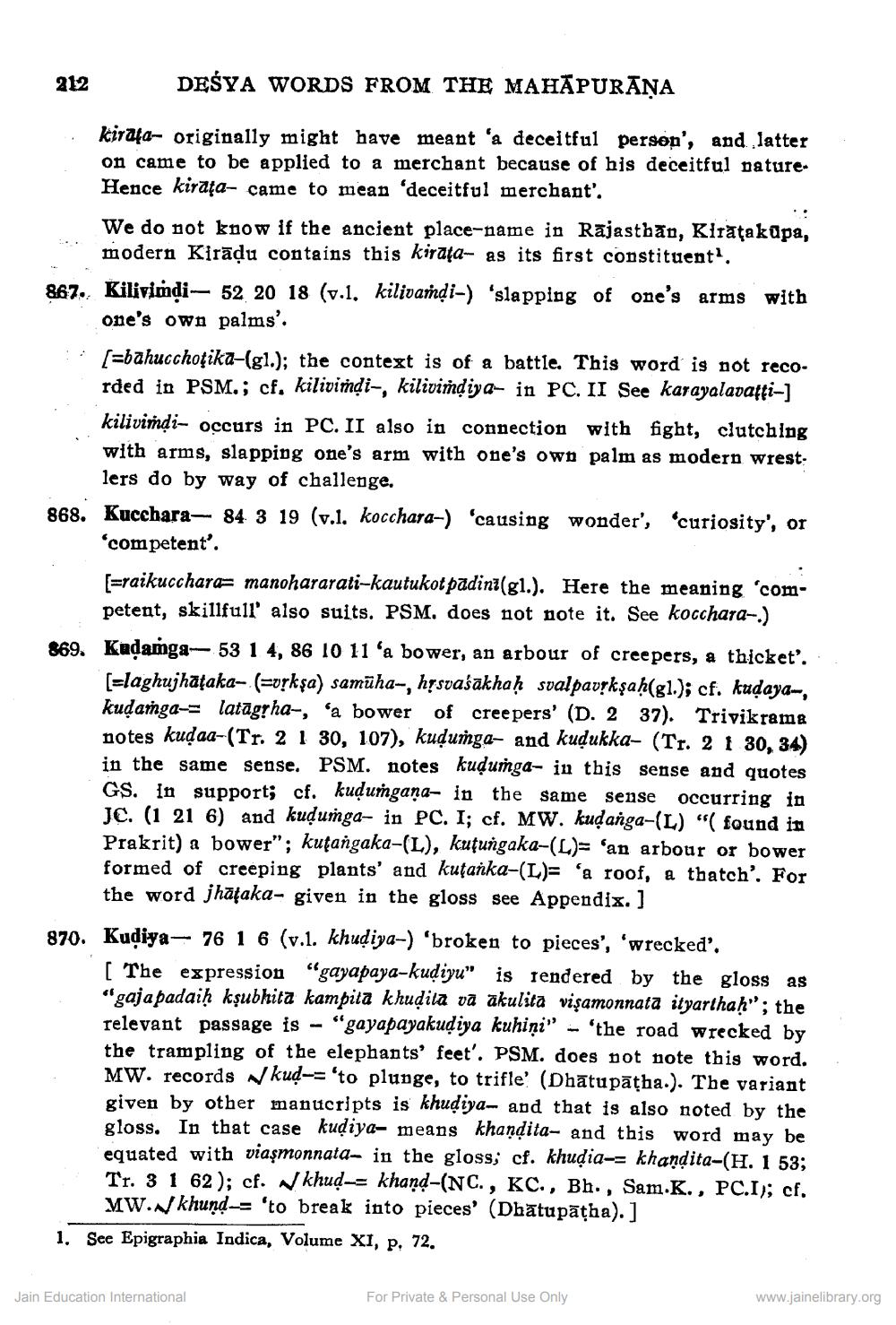________________
212
DEŚYA WORDS FROM THE MAHĀPURĀŅA
kirata- originally might have meant 'a deceitful person', and latter on came to be applied to a merchant because of his deceitful natureHence kirata- came to mean 'deceitful merchant'.
We do not know if the ancient place-name in Rajasthān, Kirățakūpa,
modern Kirādu contains this kirafa- as its first constituent. 867. Kilivimdi— 52 20 18 (v.1. kilivamdi-) 'slapping of one's arms with
one's own palms'. :: f=bahucchoţika-(gl.); the context is of a battle. This word is not reco
rded in PSM.; cf, kilivimdi-, kiliviñdiya- in PC. II See karayalavatti-] kilivindi- occurs in PC. II also in connection with fight, clutching with arms, slapping one's arm with one's own palm as modern wrest.
lers do by way of challenge. 868. Kucchara— 84 3 19 (v.1. kocchara-) 'causing wonder', 'curiosity', or
'competent'.
[Eraikuccharas manohararati--kautukot padini(gl.). Here the meaning 'competent, skillfull' also suits. PSM. does not note it. See kocchara-.)
869. Kadamga— 53 1 4, 86 10 11 'a bower, an arbour of creepers, a thicket.
(=laghujhāțaka-(=víkşa) samüha-, hfsvašakhaḥ svalpavrkşah(gl.); cf. kudaya-, kudanga-- latāgsha-, 'a bower of cree pers' (D. 2 37). Trivikrama notes kuļ aa-(Tr. 2 1 30, 107), kudurga- and kudukka- (Tr. 2 1 30, 34) in the same sense. PSM. notes kudusga- in this sense and quotes GS. in support; cf. kudumgana, in the same sense occurring in JC. (1 21 6) and kudumga- in PC. I; cf. MW. kudanga-(L) "( found in Prakrit) a bower"; kutangaka-(L), kutungaka-(L)= 'an arbour or bower formed of creeping plants' and kutarka-(L)= 'a roof, a thatch'. For the word jhataka- given in the gloss see Appendix. ]
870. Kudiya- 76 1 6 (v.1. khudiya-) 'broken to pieces', 'wrecked'.
The expression "gayapaya-kudiyu" is rendered by the gloss as "gaja padaiḥ kṣubhita kampita khudila va akulita vişamonnata ityarthah"; the relevant passage is - "gayapayakudiya kuhiņi" - 'the road wrecked by the trampling of the elephants' feet'. PSM. does not note this word. MW. records kud-= 'to plunge, to trifle (Dhātupātha.). The variant given by other manucripts is khudiya, and that is also noted by the gloss. In that case kudiya- means khandita- and this word may be equated with viaşmonnata- in the gloss; cf. khudia-s khandita-(H. 1 53; Tr. 3 1 62); cf. ~khud- khand-(NC., KC., Bh., Sam.K., PC.I); cf.
MW. khund-- 'to break into pieces' (Dhātupātha).] 1. See Epigraphia Indica, Volume XI, p. 72.
Jain Education International
For Private & Personal Use Only
www.jainelibrary.org




